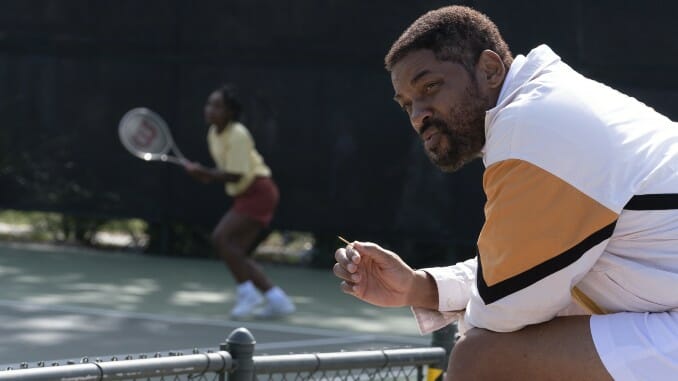Aggrandizing Biopic King Richard Serves Tennis Patriarch an Uncritical Softball

King Richard is a movie about the ends justifying the means. It’s a movie about bootstraps and hard work and outsiders overcoming odds through persistence. It’s also one about cherry-picking, hypocrisy and smoothed edges. But it barrels through those parts. Doesn’t let them stick. As we learn, the movie is a lot like Richard that way. Its incurious approach to telling the making-of story behind two of history’s most dominant athletes, tennis titans Venus and Serena Williams going from Compton to Wimbledon, sadly fits the expectation when it comes to authorized biopics. Though director Reinaldo Marcus Green finds winning performances away from his lead, the milquetoast script serves the tennis patriarch a soft lob—one without potential to inspire or excite, and one that’s constantly reminding us that we already know how it ends.
It’s hard to generate too much lasting conflict around the young careers of Venus (Saniyya Sidney) and Serena (Demi Singleton) when their place in the record books is so firmly and recently established. It’s never a question of “Will this all work out?” no matter how many doubters or environmental obstacles screenwriter Zach Baylin puts in their father’s way. That there’s not much else to the film—no insight into the pair or their family, aside from the rah-rah Richard show—explains why it all feels so lifeless. At its core is Will Smith’s portrayal of Richard Williams, obsessive and confident father of Venus and Serena (as well as many others whose abilities apparently didn’t inspire him to create/devote his life to a meticulous plan for their careers), which is well-researched, consistent and feels as much like a costume as his tiny little ‘80s short-shorts.
-

-

-

-

-

-

-

-

-

-

-

-

-

-

-

-

-

-

-

-

-

-

-

-

-

-

-

-

-

-

-

-

-

-

-

-

-

-

-

-








































